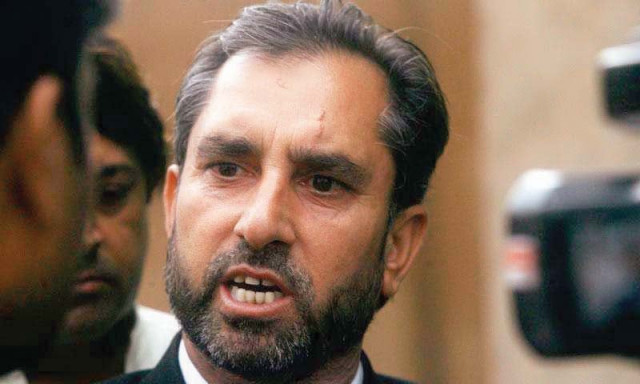Transitions: Self-preservation and the struggle for justice
Samiullah Afridi had to choose between quitting Dr Shakil Afridi’s panel or losing his life.

Samiullah Afridi. PHOTO: FILE
In May 2011, Dr Afridi, a former surgeon, had run a phony health campaign in Abbottabad to help the CIA track down Osama bin Laden in his compound and kill him in a controversial raid. A year later, Dr Afridi was sentenced to 33 years in prison by the political administration of Khyber Agency under the Pakistan Penal Code for having links with banned militant groups.
Samiullah was among the panel of lawyers who had appealed against the sentence. In August 2013, Dr Afridi’s legal team had persuaded late FCR commissioner Sahibzada Muhammad Anis to overturn the sentence. On March 15, 2014, the then FCR commissioner had upheld Dr Afridi’s sentence but dropped one of his charges, reducing his jail term from 33 to 23 years.
Although the panel comprised a large number of lawyers – including Ijaz Mohmand, Abdul Latif Afridi and Qamar Nadeem – Samiullah remained at the forefront of the struggle to acquit Dr Afridi.
However, he paid a heavy price for his commitment and dedication. Samiullah began receiving countless death threats from militant organisations. The threats intensified after Dr Afridi’s sentence and the attorney was left with the option of either quitting the panel or falling prey to the militant’s gun.
Samiullah realised the gravity of the situation and decided to act quickly. Driven by self-preservation, he left for the United Arab Emirates in December 2013. After six months in self-imposed exile, the deceased attorney returned to Pakistan and announced his decision to dissociate himself from the case.
Salim Afridi, one of Samiullah’s assistants, believes the deceased attorney’s decision to leave the case assuaged his fears about threats to his life.
“At the time, when he was involved in the case, there were serious threats to his life,” he says. “However, after he quit Dr Afridi’s case, he stopped receiving the threats.”
Currently, the former surgeon’s review petition is pending before the FATA Tribunal and is being pursued by his counsel Qamar Nadeem Afridi.
Life after Dr Afridi’s case
After he distanced himself from the case, Samiullah turned his attention to other matters. In 2014, he had succeeded in obtaining a verdict from the Peshawar High Court to constitute a board to compensate the displaced population from Bara. Samiullah also challenged the implementation of the Frontier Crimes Regulation, a set of colonial laws which govern Pakistan’s tribal regions.
In an earlier interview with The Express Tribune in May 2014, the deceased attorney had cited three reasons for quitting Dr Afridi’s case.
“Dr Aafia Siddiqui’s case, the pressure imposed by the United States on Pakistan to release Dr Afridi and, more significantly, the death threats I have been receiving from militants are main reasons why I cannot pursue this case anymore,” he had said.
Published in The Express Tribune, March 19th, 2015.













COMMENTS
Comments are moderated and generally will be posted if they are on-topic and not abusive.
For more information, please see our Comments FAQ